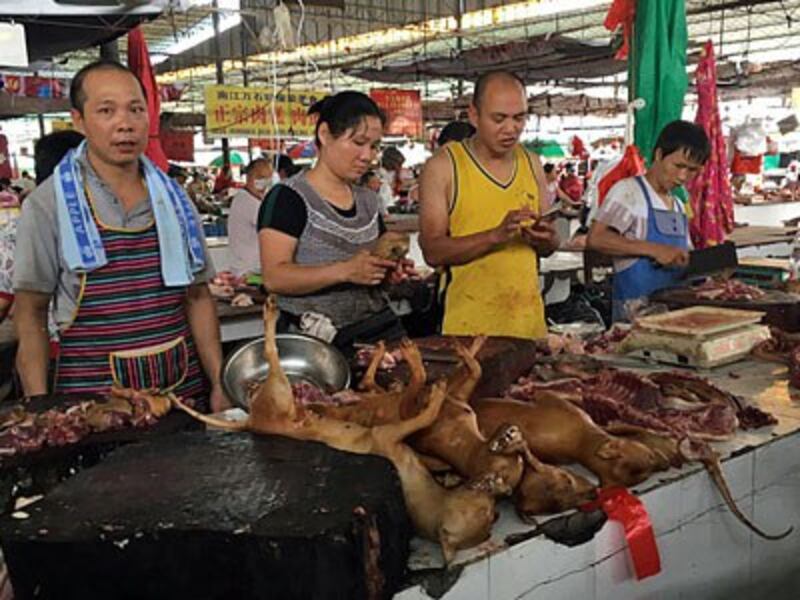A controversial Chinese dog meat festival went ahead on Wednesday despite of reports of a ban on the sale of dog meat and years of campaigning by animal rights groups.
Dog-meat sellers in Yulin, in the southwestern region of Guangxi, were preparing canine carcasses for the city's many restaurants and food stalls as the city's summer solstice tourist event swung into gear.
Earlier reports that the sale of dog meat had been banned were denied by the city government last week, although local vendors told RFA that officials had asked market stallholders to limit the amount on display.
Leading animal rights campaigner Gong Zengheng, the founder of the U.S.-based Duo Project, said in a recent interview that while there was no outright ban, sales had definitely fallen in recent weeks following mass petitions and campaigns by international animal welfare groups.
"They banned the sale of dog meat on June 15 for seven days, which includes the dog-meat festival," she told RFA. "But they never said they would stop the festival."
"Then, they changed their tune on June 13, because there was a huge backlash from the dog-meat traders, and said that, instead, each stall could only have two dog carcasses displayed at any given time," she said.
Fellow rights activist Dong Tian said many of the controls appeared to be aimed at minimizing unpleasant images that routinely make their way into overseas media outlets.
"They have stepped up controls over the markets and the slaughterhouses," he said, saying officials are trying to stop traders from slaughtering, butchering, cleaning, and skinning carcasses in public view, with many traders building freezer cabinets to store their meat.
"All of that butchering work is being done on the outskirts of town in the countryside, and then the carcasses are being transported into the city," Dong Tian said. "I think perhaps slaughtering live dogs on the spot kept their overheads down."
"They can keep live dogs for two or three days without giving them food or water, but if they have to freeze them, then that sends up the costs for the stallholders, and they can't make a profit," he said, adding that he had been followed by plainclothes police since arriving in the city to monitor the event.

‘Forced to compromise’
Gong said the Yulin city government had been "forced to compromise" by the dog-meat traders.
"I think this is pretty strange," she said. "What's the difference between displaying two carcasses and displaying several more? I don't see how that's meaningful."
Gong said she supports the original decision by Yulin municipal officials to ban the sale of dog meat, but she understood the kind of pressure they are under.
"There are no laws in China forbidding the sale of dog meat, so they can't really say to people that anyone living anywhere else in the country can eat dog meat, but that the residents of Yulin can't," she said. "
"I think they faced such a big backlash that they were forced to compromise," Gong said. "They're not going to be able to just tell people not to hold the festival when this campaign has only just started, but I still think we should encourage this sort of thinking."
News photos of the festival showed market stallholders chopping up skinned dog carcasses tensed into a rictus snarl, while live dogs waited in overcrowded cages for the slaughter.
"At Duo Duo, we are trying to use education to stop Chinese people from eating dog meat," Gong said. "We want to use encouragement and positive reinforcement, not criticism, because it doesn't work."
"If we can just persuade the people who eat dog meat to stop eating it, then we won't have anything to worry about, because there will no longer be a market," she said, drawing a parallel with Taiwan, where people have largely given up eating dogs.
"There wasn't even any need for a law; people just stopped eating it because ... they were embarrassed to do it," Gong said. "Taiwan didn't even have any animal protection laws at that time," Gong said.
She said the Duo Duo Project, founded in 2013, has run campaigns targeting the Yulin festival since 2014, and has found a general lack of comprehension of the concept of animal rights.
"Ordinary Chinese people tend to take the view that, in a situation where humans aren't even being properly protected, why would we focus on protecting animals?" Gong said. "But we are coming at it from the angle of anticruelty. Whether it's cruelty to people or to animals, it's still inhumane."
"I think that's the best approach to take in China," she said.
Thousands of dogs and cats are slaughtered for human consumption at the Yulin event, part of an annual trade across China that sees more than 10 million dogs and four million cats annually killed for eating, many of them stolen pets and strays, according to estimates compiled by Duo Duo and other animal charities.
Campaigners say Yulin dog traders have tried to bill the festival as a traditional event, while it was actually launched in 2010 in a city that had previously seen little consumption of dog meat.
A survey carried out last month by Chinese state-registered charities and assisted by a team of six research staff from the Yulin municipal government found that 72 percent of Yulin residents do not regularly eat dog meat, with just 28 percent eating it on a regular basis.
Reported by C.K. for RFA's Mandarin Service, and by Goh Fung for the Cantonese Service. Translated and edited by Luisetta Mudie.
